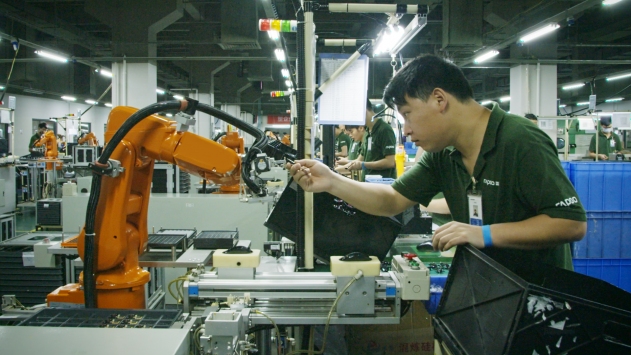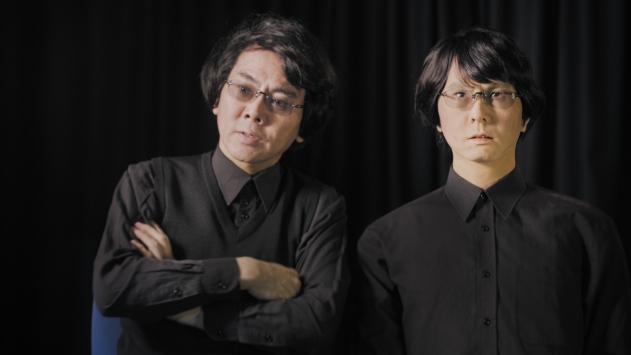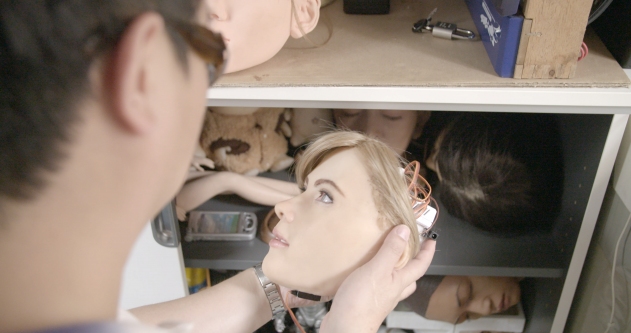
THE TRUTH ABOUT KILLER ROBOTS, directed by Maxim Pozdorovkin (OUR NEW PRESIDENT), interrogates the use of robots as drivers, workers, and ultimately companions. Pozdorovkin focuses on the effects that robots are having on people, including instances in which they have caused injury or death. The documentary, which premiered at the 2018 Toronto International Film Festival, is now on HBO. We spoke by phone with Pozdorovkin the week before the film’s release on November 26.
Science & Film: Your film has a skeptical tone in relation to automation. How did you decide on this approach?
Maxim Pozdorovkin: With the film, I tried to correct certain blind spots that exist in our talking about robots, automation, and artificial intelligence. Most discussions are about what robots can do for you rather than what robots do to you. Moreover, the entirety of the films and books that I read in my three years making THE TRUTH ABOUT KILLER ROBOTS were told in the voice of the technology owners and engineers—the people who are profiting from this technology. Therefore, the only kind of threat that they are writing about is something that would affect them, which is a potential long-term consequence of higher order general artificial intelligence destroying us all. The dominant ideology within the tech community is a deranged technological optimism. There is a belief that—as a professor at Carnegie Mellon University says in the film—technology will solve global warming, terrorism, and structural inequality. It’s a kind of false hope that is perpetrated by this narrative of what robots can do for you, and that made me want to make a movie about what they do to you.
What I realized was that the biggest blind spot was [considering] AI as a potential future threat, which made us kind of myopic and blind to the way that automation is transforming us now. It is having effects on qualitative things: de-skilling, the stripping of dignity from labor, loss of memory, and spatial orientation.

Photo Courtesy of HBO
S&F: The fact that you ended the film with the way that robots are replacing women, I found infuriating and also very disturbing. Why did you want to end the film there?
MP: I tied the first few acts of the film to specific sectors of the economy. The first act deals with manufacturing, the second with the service sector, and the third with things that we once believed could not be automated. What irritated me to no end about the subject of sex robots was that popular culture always asks the question, is the sex any good? As if that’s the most interesting or relevant question. It is completely uninteresting. By showing an engineer who marries his android girlfriend, I wanted to think about, what are the factors in society that bring that reality about? [The answer is] demographics. Because of the One Child Policy in China the discrepancy between men and women is most pronounced there.
S&F: I’m curious how the idea for this film came about. In terms of why you made it, it sounds from what you’re saying like it was because you wanted to show the perspective of people who don’t normally have a voice within the technological-industrial complex.
MP: That’s right. The idea for the film came about when I heard about this incident at the Volkswagen factory [in 2015 an assembly-line robot killed the contractor who was setting it up]. The initial media response was predictable, apocalyptic, TERMINATOR-like. Germany has very strict privacy laws so very little information was available and very little information is still available because the case is technically still open. But, I was surprised that no one was able to think through this [incident] a little more. When I went to the factory and talked with the workers, a lot of them were forbidden from speaking about the accident but were very glad to talk about how their experience as auto workers was transformed by the presence of robots. I wanted the film to start with three cases where automation was the literal cause of death, and I wanted to consider automation as a kind of metaphorical death—processes of dehumanization and submerging of human life into the rhythm and structures of machines has this effect.
The history of the word robot is that when something is introduced that does a human-like task, it’s called a robot. When it becomes ubiquitous, it’s just called a machine. The semantic terrain is always shifting. That’s what creates some of these blind spots.

Roboticist Hiroshi Ishiguro and his Geminoid robot. Photo Courtesy of HBO.
S&F: The film has screened at different festivals in a lot of different locations, most recently at DOC NYC. To the extent that you went with it, is there anything you noticed about the audience response that differed by location?
MP: No, not really. But I’ll tell you one story about a really serendipitous cab ride. I took a cab to our premiere at TIFF [the Toronto International Film Festival] and had an Ethiopian cab driver who said that, TIFF used to be a wonderful time for us because it was kind of like Christmas. If you were a cab driver, you would have a guaranteed spike of income during this time. Uber and Lyft have completely destroyed that so now when there is a spike in demand, more of the freelance drivers plug in and suck out all that extra money. The people who actually drive full time or for a living inevitably lose. It was devastating. The other day, there was just another case of a cabbie committing suicide. I thought that there were a lot of productive connections between literal and metaphorical death, and sometimes the metaphorical death merges into a literal death.

Photo Courtesy of HBO
THE TRUTH ABOUT KILLER ROBOTS is now available on HBO. The film was directed, produced, and edited by Maxim Pozdorovkin; produced and filmed by Joe Bender, and edited by Isabel Ponte. Pozdorovkin’s other films include OUR NEW PRESIDENT and PUSSY RIOT: A PUNK PRAYER.
TOPICS